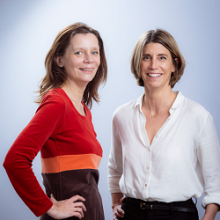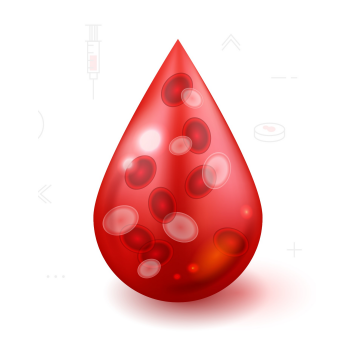
« Advances in research and treatment while supporting and listening to the patient: the keys to recovery and quality of life »
Red September 2025

September, the awareness month for haematological cancers, is the perfect opportunity to inform, support, and highlight the importance of research and specialised care. The Haematology Department of the H.U.B. is organising several events for patients and their families : see our agenda/news sections.
On 24/9 and 01/10/2025 (patients seminars) join our experts to learn more about blood cancers, current treatments, and the daily challenges they present.
How we treat blood cell cancers
The Institut Jules Bordet treats all haematological cancers, ie blood cell and lymphatic cancers.

The examinations required to confirm and specify diagnosis depend on the type of cancer:
- For blood cancers (leukaemia, myelodysplasia):
- blood tests and bone marrow aspiration to enable a detailed genetic analysis;
- bone marrow biopsy;
- ultrasound of the liver and spleen.
- For lymphatic cancers (non-Hodgkin lymphoma, Hodgkin lymphoma, multiple myeloma, etc):
- full clinical examination focusing particularly on the lymph nodes (which is where lymphomas originate);
- blood tests;
- biopsy and bone marrow aspiration;
- PET scan;
- other examinations specific to the site of the condition: brain scan, digestive endoscopy, skin biopsy, etc.
Cell therapy has been used in hematology to carry out bone marrow and stem cell transplants, that is, the transplanting of cells from which other blood cells develop (red and white corpuscles, platelets, etc.). These transplants make it possible to reconstitute a new immune system that is able to combat tumours. Cell therapy expands into many other fields of medicine, such as immunotherapy to combat cancers that do not respond to chemotherapy, regenerative medicine and gene modification to cure rare diseases of the red blood corpuscles. It can also be used correct certain immune-related phenomena and to prevent the body from rejecting transplants of solid organs such as the liver or kidney. Some types of relapsed lymphomas have access to innovative cell therapy: CAR-T cells.
- Find out more about cell therapy:
Every year many patients want to request a second medical opinion from our multidisciplinary teams.
Not all the doctors and hospitals will necessarily have the expertise, experience and/or equipment needed for an optimal approach to all types of cancer. At the Jules Bordet Institute this is our job! Requesting a second medical opinion is therefore often useful and reassuring for the patient. This is especially true in the case of rare cancers and/or cancers requiring complex or innovative treatment.
- To request a second opinion for a hematological cancer: Tel: +32 (0)2 541 36 84
- To find out more about a second opinion, see our page "second opinion"
The aims of post-cancer care are multiple:
- to keep an eye on the physical and psychological state of the patient
- to manage any medium or long-term secondary effects of certain treatments
- to detect any recurrence as soon as possible
- to identify any new cancer.
Recurrence means that cancer cells reappear after a period of remission that can vary from a few months to several years. It can also happen that the same patient develops different cancers several years apart. In all these cases, the earlier a recurrence or cancerous disease is detected, the faster a new therapeutic strategy can be offered.

